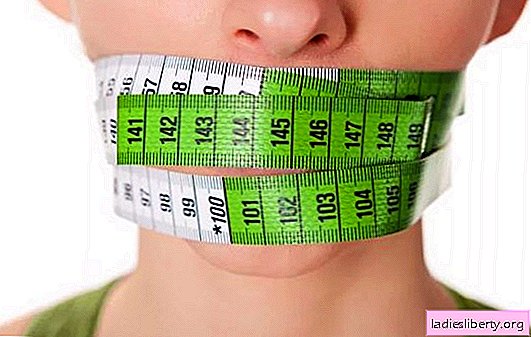
The understanding that when choosing a method of losing weight would be nice to talk with a dietitian does not come immediately. Usually a person comes to this correct and necessary decision, having already performed 2-3 unsuccessful experiments on himself.
Such an approach to one’s health leads, at best, to unjustified financial costs, and at worst, to exacerbation of existing diseases or the emergence of new diseases.
In this regard, we dwell on mistakes that are often made when certain dietary restrictions are observed in order to lose weight.
Error 1: you do not have a list of valid products
This mistake is evidenced by a very common justifying wording: "I don’t eat it now, because I’m on a diet." This expression is universal: in this way you can turn away from sweet, meat, flour, fat, salty, etc.
Many of those who adhere to some kind of weight loss system can not clearly explain what they can eat. The flip side of any dietary prohibitions should be a clear knowledge of what is allowed. Therefore, choosing a diet for yourself, you need to have a good idea of what your diet will form for the time you lose weight.
It’s even better to make a list of these products. Nutrition planning according to the situation is shortsighted. In practice, such a "losing weight" eventually agrees to a salad with mayonnaise or a piece of pork belly.
Error 2: you do not have a system in power
Its development is the next step after compiling a list of acceptable dishes. You should more carefully determine what kind of food will consist of breakfast, lunch and dinner, what exactly you will eat at home, and what - at work.
All such moments, no matter how insignificant they may seem to you, should be considered in advance. Do not count on "maybe something to eat" or that you can get by with a bottle of mineral water.
This approach will lead to the fact that on the second day you will feel the urge to "lose weight". One way or another, physiology will prevail over your good aspirations.
Mistake 3: your diet includes large portions of low-calorie foods
Of course, a green salad with fresh cucumbers will help you lose weight, but this will not happen as soon as you expect. The fact is that from a huge amount of low-calorie food, the stomach also stretches and begins to require new servings of food.
This comes from the fact that the feeling of fullness directly depends on the degree of its fullness. In addition, a simple calculation can show you that the total energy value of all servings of a salad eaten per day already exceeds the dietary limit for calorie intake.
Mistake 4: your diet is unbalanced
Nutrition should be balanced in terms of the content of fats, carbohydrates, proteins, vitamins and minerals. And we often neglect such subtleties.
For example, if you are planning a diet experiment that will last 2-3 days, provide a reserve, due to which you will replenish the possible shortage of certain nutrient components.
In the event that you decide to adhere to a diet long enough, for example 2-3 weeks, think about how nutritional restrictions can affect the functioning of individual systems, and make sure that all valuable substances enter the body in the required amount.
Error 5: abrupt start and end of the diet
Remember, when hasty decisions are usually made “by all means from tomorrow” to go on the strictest diet?
Often during or after a plentiful feast. The conditions when you first brutally “overfeed” the body, and then immediately deprived even of the most necessary, can be called the most extreme of all stressful situations.
It’s worth not starting any diet immediately, but gradually, every day reducing the calorie content of the diet, the amount of fat, etc. Returning to your usual diet should also be done gradually, otherwise you will very quickly gain kilograms removed with such difficulty.
In addition, this rule will protect you from possible health problems.
Error 6: you eat irregularly
Try to adhere to a strict system of meals.
For example, you have planned to eat every 4 or even 2 hours (it depends on which diet you have chosen).
With fractional, but regular nutrition, the body will quickly adapt to the new regime.
Mistake 7: you have chosen a very strict diet
Recent scientific evidence suggests that too tight diets, as a rule, provoke the body not only to return the "lost", but to "grab" the excess.
So, the German dietitian Rudolf Royman conducted an experiment on himself. For several months, the researcher deliberately overestimated the norm of his daily diet by 800 kcal.
First, his body mass increased slightly, and then stabilized at a certain level.
After that, Roiman decided to check on himself the recommendations that obese patients usually receive from doctors: he reduced the caloric intake by about three times, and then starved for 10 days.
The experimenter lost a lot of weight and returned to his normal diet. And here the scientist was completely unexpected: after 2 weeks he had to go to the store to buy himself a suit 2 sizes larger.
A similar experiment was conducted in the United States with the participation of 45 volunteers who every day exceeded the calorie content of their diet by 1000 kcal. The menu of individual experimental subjects was estimated at almost 10,000 kcal. As in the case of Royman, to a large extent, none of the participants recovered, and some even had a loss of several kilograms. After that, the subjects were "put" on a rigid diet, and they lost weight.
The return to normal nutrition was marked by the fact that everyone began to gain weight. This fact is explained by the fact that after spending some time on a "starvation diet", the human body, "taught" by bitter experience, begins to more actively form stocks of adipose tissue.
In addition, with a sharp decrease in caloric intake, metabolic processes in the body slow down. When you return to old eating habits, the already changed mechanism of metabolic reactions does not have time to adapt, and all organs continue to work in the economy mode. So is it any wonder that a strict weight gain follows a strict diet?
Mistake 8: your diet promises lightning fast results
You need to know that with a decrease in caloric intake, the body inevitably removes a large amount of water.
This explains the amazing effect, when in the first days of such a diet you suddenly lose weight by 3 kg.
However, the volume of lost fluid will surely recover after the body adapts to the regime of restrictions and slows down metabolic processes. Frustrated by the lack of further visible results, you can immediately abandon the diet, and then the weight gain will be more noticeable.
Error 9: you decided to combine several methods of losing weight at once, for example, the Montignac diet and separate nutrition
Many diets and methods of losing weight contradict each other in the prohibition of certain foods. Therefore, an attempt to combine them will only add ambiguities and doubts, which will inevitably affect not the best way on the results.
Mistake 10: you have too much reduced the amount of protein in the diet
Under such conditions, the diet may not be effective. In this case, the body stores fat, but does not spend it. At the same time, muscle mass melts. But metabolism directly depends on it.
Thus, the conclusion suggests itself: the metabolic rate will be higher if you consume enough protein foods - fish, lean meat. Calorie intake is really better to reduce, but not at the expense of protein.
Tips for losing weight
Impartial statistics confirm the following fact: every second person fails when he "sits" on a diet. If your weight continues to be a problem for you, then there are reasons.
First of all, get rid of the habit of swallowing food quickly. In general, doctors recommend chewing it thoroughly: in this we primarily help our own digestion.
In addition, a sense of fullness comes sooner. To accustom yourself to absorb food correctly, as follows. The next time you sit at the table, first bite off a piece, chew it well for a while, then set aside the fork and take a few sips of water. So keep eating. Observe how many minutes it takes for you to have such a meal, and continue to maintain the same pace in food.
Secondly, do not forget about fiber. In bakery products, so beloved by many, it is not enough. Meanwhile, fiber, which is found in fruits and vegetables and has almost no nutritional value, can “reset” digestion, balance the level of insulin and sugar in the blood and give a feeling of full saturation. Try to enrich your diet with plant fibers, then you will have no problems not only with bowel movement, but also with metabolism. Eat whole grain cereals, nuts, granola and beans.
Thirdly, Try not to flatter yourself with the quick-to-see effects of the diet. If you have already managed to lose a few kilograms and think that now you and the sea are knee-deep, a breakdown is possible. Thoughts that you are no longer threatened with weight gain, or that you are able to quickly cope with a similar problem that has arisen again, can provoke uncontrolled bouts of gluttony. Throwing a diet before you have stabilized weight is unreasonable. Remember how much effort you put in to achieve the desired result, and pull yourself together. Of course, if you have lost enough weight, then you should reconsider the level of sports loads and diet. This should be aimed either at further weight loss, or at consolidating what has been achieved.
Fourth, a return to the old diet after a diet should nevertheless imply certain changes. It is worth reconsidering the attitude to sausages and semi-finished products. For some reason, it is believed that, for example, doctor’s sausage is a completely dietary product and even contributes to weight loss, it is not for nothing that it has such a name. However, it contains about 30% of saturated animal fat, so it will probably be right to completely refuse to buy such products.











